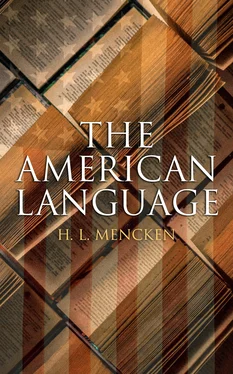Lounsbury went even further. In the course of a series of articles in Harper's Magazine, in 1913, 19he laid down the dogma that "cultivated speech ... affords the only legitimate basis of comparison between the language as used in England and in America," and then went on:
In the only really proper sense of the term, an Americanism is a word or phrase naturally used by an educated American which under similar conditions would not be used by an educated Englishman. The emphasis, it will be seen, lies in the word "educated."
This curious criterion, fantastic as it must have seemed to European philologists, was presently reinforced, for in his fourth article Lounsbury announced that his discussion was "restricted to the written speech of educated men." The result, of course, was a wholesale slaughter of Americanisms. If it was not impossible to reject a word, like White, on the ground that some stray English poet or other had once used it, it was almost always possible to reject it on the ground that it was not admitted into the vocabulary of a college professor when he sat down to compose formal book-English. What remained was a small company, indeed—and almost the whole field of American idiom and American grammar, so full of interest for the less austere explorer, was closed without even a peek into it.
White and Lounsbury dominated the arena and fixed the fashion. The later national experts upon the national language, with a few somewhat timorous exceptions, pass over its peculiarities without noticing them. So far as I can discover, there is not a single treatise in type upon one of its most salient characters—the wide departure of some of its vowel sounds from those of orthodox English. Marsh, C. H. Grandgent and Robert J. Menner have printed a number of valuable essays upon the subject, but there is no work that co-ordinates their inquiries or that attempts otherwise to cover the field. When, in preparing materials for the following chapters, I sought to determine the history of the a -sound in America, I found it necessary to plow through scores of ancient spelling-books, and to make deductions, perhaps sometimes rather rash, from the works of Franklin, Webster and Cobb. Of late the National Council of Teachers of English has appointed a Committee on American Speech and sought to let some light into the matter, but as yet its labors are barely begun and the publications of its members get little beyond preliminaries. Such an inquiry involves a laboriousness which should have intrigued Lounsbury: he once counted the number of times the word female appears in "Vanity Fair." But you will find only a feeble dealing with the question in his book on pronunciation. Nor is there any adequate work (for Schele de Vere's is full of errors and omissions) upon the influences felt by American through contact with the languages of our millions of immigrants, nor upon our peculiarly rich and characteristic slang. There are several excellent dictionaries of English slang, and many more of French slang, but I have been able to find but one devoted exclusively to American slang, and that one is a very bad one.
§ 3
The View of Writing Men
Table of Contents
—But though the native Gelehrten thus neglect the vernacular, or even oppose its study, it has been the object of earnest lay attention since an early day, and that attention has borne fruit in a considerable accumulation of materials, if not in any very accurate working out of its origins and principles. The English, too, have given attention to it—often, alas, satirically, or even indignantly. For a long while, as we shall see, they sought to stem its differentiation by heavy denunciations of its vagaries, and so late as the period of the Civil War they attached to it that quality of abhorrent barbarism which they saw as the chief mark of the American people. But in later years they have viewed it with a greater showing of scientific calm, and its definite separation from correct English, at least as a spoken tongue, is now quite frankly admitted. The Cambridge History of English Literature, for example, says that English and American are now "notably dissimilar" in vocabulary, and that the latter is splitting off into a distinct dialect. 20The Eleventh Edition of the Encyclopaedia Britannica, going further, says that the two languages are already so far apart that "it is not uncommon to meet with [American] newspaper articles of which an untravelled Englishman would hardly be able to understand a sentence." 21A great many other academic authorities, including A. H. Sayce and H. W. and F. G. Fowler, bear testimony to the same effect.
On turning to the men actually engaged in writing English, and particularly to those aspiring to an American audience, one finds nearly all of them adverting, at some time or other, to the growing difficulties of intercommunication. William Archer, Arnold Bennett, H. G. Wells, Sidney Low, the Chestertons and Kipling are some of those who have dealt with the matter at length. Low, in an article in the Westminster Gazette 22ironically headed "Ought American to be Taught in our Schools?" has described how the latter-day British business man is "puzzled by his ignorance of colloquial American" and "painfully hampered" thereby in his handling of American trade. He continues:
In the United States of North America the study of the English tongue forms part of the educational scheme. I gather this because I find that they have professors of the English language and literature in the Universities there, and I note that in the schools there are certain hours alloted for "English" under instructors who specialize in that subject. This is quite right. English is still far from being a dead language, and our American kinsfolk are good enough to appreciate the fact.
But I think we should return the compliment. We ought to learn the American language in our schools and colleges. At present it is strangely neglected by the educational authorities. They pay attention to linguistic attainments of many other kinds, but not to this. How many thousands of youths are at this moment engaged in puzzling their brains over Latin and Greek grammar only Whitehall knows. Every well-conducted seminary has some instructor who is under the delusion that he is teaching English boys and girls to speak French with a good Parisian accent. We teach German, Italian, even Spanish, Russian, modern Greek, Arabic, Hindustani. For a moderate fee you can acquire a passing acquaintance with any of these tongues at the Berlitz Institute and the Gouin Schools. But even in these polyglot establishments there is nobody to teach you American. I have never seen a grammar of it or a dictionary. I have searched in vain at the book-sellers for "How to Learn American in Three Weeks" or some similar compendium. Nothing of the sort exists. The native speech of one hundred millions of civilized people is as grossly neglected by the publishers as it is by the schoolmasters. You can find means to learn Hausa or Swahili or Cape Dutch in London more easily than the expressive, if difficult, tongue which is spoken in the office, the bar-room, the tram-car, from the snows of Alaska to the mouths of the Mississippi, and is enshrined in a literature that is growing in volume and favor every day.
Low then quotes an extract from an American novel appearing serially in an English magazine—an extract including such Americanisms as side-stepper , saltwater-taffy , Prince-Albert (coat), boob , bartender and kidding , and many characteristically American extravagances of metaphor. It might be well argued, he goes on, that this strange dialect is as near to "the tongue that Shakespeare spoke" as "the dialect of Bayswater or Brixton," but that philological fact does not help to its understanding. "You might almost as well expect him [the British business man] to converse freely with a Portuguese railway porter because he tried to stumble through Caesar when he was in the Upper Fourth at school."
Читать дальше












